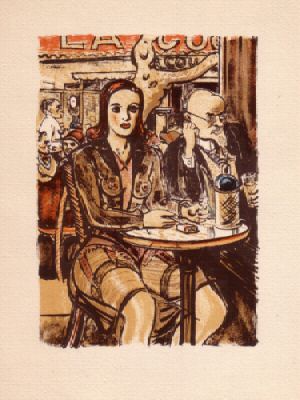Codex Ivstianvs
Why, hello. Fancy seeing you here.




Friday, July 28, 2006
Monday, July 24, 2006
The New and Improved.
Planned Features include:
I will attempt to expand and (ahem) diversify this group--sorry, I'll come up with some non-white, non-dude candidates. Like Simple. Yeah Simple, and Andromache.
I can't wait.
Read more
Sunday, July 16, 2006
Homeboy
 I have moved back to my native land of Colorado to look for work. And now that I have relocated to the homeland, I'd like to extend this invitation for people to not move here and ruin it. If you are a young wanker and see MTV's Real World: Denver (currently filming) when it airs and you think to yourself, "Man, I want to move there." If you are that person, do me a favor and shoot yourself.
I have moved back to my native land of Colorado to look for work. And now that I have relocated to the homeland, I'd like to extend this invitation for people to not move here and ruin it. If you are a young wanker and see MTV's Real World: Denver (currently filming) when it airs and you think to yourself, "Man, I want to move there." If you are that person, do me a favor and shoot yourself.
Read more
Friday, July 07, 2006
I wish you a long a prosperous High Life.
Yes, I am enjoying the Champagne of Beers right now, why do you ask?
Read more
The paths of glory lead but to the grave. -- Thomas Gray
You should just go ahead and see it. Wait until you see the scene with the German singing girl. I can't believe I'd never seen this.
Also, completely unrelated. But how much does Dashboard confessional suck? A lot, right? Because I think that the answer is that Dashboard Confessional sucks a lot. Man, they are so sad and deep. You don't even know.
Labels: movies
Read more
The Incident at Indian River
A large Delaware school district promoted Christianity so aggressively that a Jewish family felt it necessary to move to Wilmington, two hours away, because they feared retaliation for filing a lawsuit. The religion (if any) of a second family in the lawsuit is not known, because they're suing as Jane and John Doe; they also fear retaliation. Both families are asking relief from "state-sponsored religion."
Apparently when one Jewish student addressed the school board he was told to remove his yamulke. Think about that. What would happen if I asked someone to removed a crucifix before they spoke to me? People would freak out. I admire that student for not throwing something heavy at the assembled school board.
I find this particularly odious as I myself am a Papist. I am a Catholic despite also being a liberal humanist (though, really, I find that the two are self-reinforcing). Then again, many of the best liberal humanists have been Roman Catholics, so that makes sense--I'm looking at you, Erasmus. There is no place in our country for this sort of bigotry especially from people who claim to worship a just God. The people of Indian River, Delaware should hang their heads in shame. Fucking hypocrites.
Labels: politics
Read more
Wednesday, July 05, 2006
The Undeservedly pseudo-Obscure Dead
 Tonight's installment isn't obscure, but I'd like to hilight aspects of his presidency that aren't usually brought to attention. It would be redundant of me to try to articulate my own biographical sketch of the man on the Fifty Dollar Bill.
Tonight's installment isn't obscure, but I'd like to hilight aspects of his presidency that aren't usually brought to attention. It would be redundant of me to try to articulate my own biographical sketch of the man on the Fifty Dollar Bill.From Wikipedia:
Ulysses S. Grant (born Hiram Ulysses Grant, April 27, 1822 – July 23, 1885) was the 18th President of the United States (1869–1877). He achieved international fame in the American Civil War, in which he commanded Union forces as a general, and as general-in-chief (1864–1869).
Military historians usually place Grant in the top ranks of great generals. He has been described by military historian J. F. C. Fuller as "the greatest general of his age and one of the greatest strategists of any age." His Vicksburg Campaign in particular is viewed with intense scrutiny from military specialists around the world, and he was the one who forced the surrender of Robert E. Lee at Appomattox. In contrast, presidential historians typically rank Grant in the lowest quartile of U.S. presidents, primarily because of widespread political and financial corruption that he tolerated (but from which he did not personally profit).
So it's well established that Grant was among the greatest generals in all of history (first to hold the rank of Lieutenant General (now just three stars) since George Washington himself--Washington was posthumously granted by Congress the rank of General of the Armies in 1976 ensuring that he should forever outrank all other officers, I would support a similar Bill for Grant, Lieutenant General of the Armies of the Union). And we know that Grant made bad appointments in his administration. And his memoirs are considered the alpha and omega of military and political writing, eclipsing even Julius Caesar's Conquest of Gaul.
But Labor Blogger Nathan Newman (he's one stop shopping for all your union/labor policy needs, I highly recommend him, he's one the best serious bloggers out there, I'd like to shake his hand because he's a great friend to the working man) has brought up U.S. Grant as an option for the greatest liberal president. This bit of Grant is largely neglected. I'll reprint his post, in part, below. It's good stuff, you shoud go read it:
...
It is odd that when liberals list the greatest Presidents, Grant rarely makes the list. Roosevelt of course is a worthy option, Kennedy gets the charisma-addict vote and Lincoln deserves respectable mention.
But why isn't Grant more honored?
In his own day, Grant was wildly popular. Grant was the only President to be elected by a majority of the voting population for two terms in the hundred years between Andrew Jackson and Franklin Roosevelt. (Other Presidents like Lincoln, Cleveland and Wilson elected for two terms in that period did not get a majority of the vote in one or both of their elections.) Grant's memoirs published just as he died met such critical and popular praise that it left his family a fortune due to its mass sales in the country.
If Grant is not more respected, it is because the fight for racial justice and Reconstruction that he oversaw has been so rawly defamed over our history to the point of almost being forgotten. As W.E.B. DuBois wrote “[n]ot a single great leader of the nation during the Civil War and Reconstruction has escaped attack and libel.”
But Grant's accomplishments should be remembered. (Some of the following is adapted from a semi-scholarly piece I co-wrote, A New Birth of Freedom: The Forgotten History of the 13th, 14th, and 15th Amendments.) Even as Grant was being elected in 1868, he faced Klan-based racial terrorism fighting to manipulate the vote throughout the South. The first result was the 15th Amendment to protect the right to vote but as importantly was the creation under Grant of the Department of Justice in 1871 and a series of "Enforcement Acts" to eliminate Klan violence. The language was sweeping in its defense of black voting rights:
Congress made it a crime for “two or more persons [to] band or conspire together, or go in disguise upon the public highway, or upon the premises of another, with the intent...to injure, oppress, threaten, or intimidate any citizen with intent to prevent his free exercise and enjoyment of any right or privilege granted or secured to him by the Constitution or laws of the United States.”Grant used his new authority to crack down on Klan terrorism in nine South Carolina counties in 1871 and essentially destroyed the Klan there and then throughout the South. Hundreds of Klansmen were convicted between 1870 and 1873 of violating the voting and other civil rights of the new freedmen in the South.The result was the election of 1872, the only election not undermined by racial terrorism until the late 1960s. In his second inaugural address, President Grant declared that racial segregation was unacceptable and called for federal legislation to assure equal rights in access to transportation and public schools. Following Grant’s lead, Congress passed the Civil Rights Act of 1875, banning segregation in public accommodations, transportation, and entertainment facilities. Majorities in both houses of Congress even voted to make school segregation illegal throughout the country, but filibusters blocked enactment of those later amendments, but it is a testament to Grant's dogged pursuit of civil rights that so encompassing a legislative and administrative agenda of racial justice was pursued.
And Grant's view of racial justice extended to the native american population. Instead of the mass murder that was typical of his predecessors and many of his successors, Grant sought what was known at the time as "the Quaker policy" in which he denounced past "wars of extermination" as "demoralizing and wicked.. A system which looks to the extinction of a race is too horrible for a nation to adopt without entailing upon itself the wrath of all Christendom." While not perfect in execution, his policies stand out in a century of American genocide against the American Indian population.
As Frederick Douglass would write much later:
To Grant more than any other man the Negro owes his enfranchisement and the Indians a humane policy. In the matter of the protection of the freedman from violence his moral courage surpassed that of his party.Unfortunately, his successors abandoned those commitments, but it is striking that Grant is so little honored for what can only be considered one of the most courageous policies of racial enlightenment of any President in American history up until Lyndon Johnson (who saved his Presidential mass murder for a different continent.)So what went wrong and why isn't Grant more honored. Basically, both his policies and reputation were murdered by Klan violence supported by the United States Supreme Court. For more read, the piece I wrote above, but the short story is that in 1873 there was a new surge of racist violence and this time the courts blocked the Grant administration from enforcing the new civil rights laws.
...But with the end of Reconstruction, we have seen history written to bury most memories of the period and assassinate the reputations of those who led it-- including Grant. There were real accusations of corruption among Grant's cabinet, although no one believes Grant himself was corrupt, but those charges of corruption appear relatively minor in light of far worse corruption in many administrations to come. But saying Grant was "corrupt" became an easy offhand way to dismiss his Presidency and Reconstruction at the same time. Even today, there are NO great films honoring reconstruction, just racist anti-Reconstruction films like Gone With the Wind [which, incidentally is why I hate that movie -- justin] and even modern documentaries like Ken Burns' Civil War only mentions accusations of corruption In Grant's administration -- without a single mention of his vigorous fight against Klan Violence.
Even liberal legal scholars seem to have unconciously buried Reconstruction, since while even many laymen can mention the Plessy v. Ferguson case decided decades laters upholding legal segregation in the South, even most lawyers haven't heard of the Cruikshank decision which licensed the Klan to commit mass murder for the next century. Partly, it's because some modern liberals have an attachment to court power and don't want to remember the shame that those same courts spent the 19th and early 20th century abetting first slavery, then Klan violence, then corporate power.
The other legacy of the collapse of Reconstruction was the Republican Party itself forgetting its own legacy of racial justice in favor of an expanded alliance with the emerging Robber Barons. Since the Radical wing of the Republicans lost their electoral base as black southerners lost their vote, the pro-corporate wing took over. This corporate wing of the party was embodied by Rutherford Hayes, elected in the divided election of 1876, who agreed to pull all federal troops from the South as part of the pact that settled that election.
But within three months of the end of Reconstruction, Hayes deployed federal troops to break the Great Strike of 1877. The federal government, having dismantled military operations in the South, built armories in the North to ensure that troops would be available for future labor conflicts. Former President Grant acidly remarked that this anti-labor wing of the Republicans were the same people who had resisted using federal troops “to protect the lives of negroes. Now, however, there is no hesitation about exhausting the whole power of the government to suppress a strike on the slightest intimation that danger threatens.”
So as corporate American sought new alliances with Southern Bourbons, the legacy of Ulysses Grant and Radical Republicans became an inconvenience, so a new consensus emerged that it had all been a mistake overseen by a corrupt and incompetent man best forgotten by history.
But here's why it's important to remember and honor Grant. While Grant didn't succeed in creating the racially just nation that he sought, his legacy was a memory of a short time when blacks did have equal rights and elected their own representatives to state and federal government -- a memory that would fuel a new civil rights movement in coming years.
And it's worth remembering that it was the democratic will of the country to have that equality, that it was only anti-democratic racist violence and a rightwing court system that frustrated that American ideal. Too many liberals buy into a myth that Jim Crow was democratically supported in this nation which just feeds its historic legitimacy.
What we should honor and remember by honoring Ulysses Grant is that his vision of racial justice was the will of the American people-- all its people -- and that the following hundred years of segregation was an illegitimate betrayal of that democratic will. In that, Grant was the true founder and implementor of the modern American nation of equal rights and if the flowering of that nation was delayed for a century with his departure from office, that's all the more reason to remember his original vision and courage-- and defy those who try to bury that memory.
So we salute you Ulysses S. Grant, you were truly a great man, and tragically ahead of your time. Rest in peace President Grant, we wish we had a man of your exemplary courage, vision, and leadership today.
Read more
The Undeservedly Famous Dead.
That is all.
Read more
Tuesday, July 04, 2006
Poetry Corner
This Is Just to Say
by William Carlos Williams
I have eatenNow I'll get back to slaying elk with my bare hands and building houses with many strong and expensive power tools and other manly things that have nothing to do with reading short, modern, love poems. Because I'm all man. Soft, pretty, emotional man.
the plums
that were in
the icebox
and which
you were probably
saving
for breakfast
Forgive me
they were delicious
so sweet
and so cold
Read more
Happy Fourth Indeed
the Supreme Court recently decided the Hamdan case. They declared the Bush military tribunals in Gitmo unconstitutional. It was a great day. And for the 7/4 I give you Commander Swift, Hamdan's military appointed lawyer:
In July, 2003, Hamdan was to be one of the first to face trial by military commission. In November, 2003, Lt. Cmdr. Swift, a Navy judge advocate general, was assigned as Hamdan's military appointed attorney. A superior officer ordered Swift to secure a plea bargain. But Swift instead decided to argue that Hamdan should be accorded the rights and protections of the Geneva Convention and that the military commissions at Guantanamo were themselves invalid.
According to reporting in The Los Angeles Times, Swift was fearful of the dangerous precedent that could be set by denying international standards of justice even to terrorists.
"I feel like we all won, that the rule of law won, and that is essentially what we are all about," Swift told the Times.
Swift also told the Associated Press yesterday that he had informed his client about the ruling by telephone. "I think he was awe-struck that the court would rule for him, and give a little man like him an equal chance," Swift said. "Where he's from, that is not true."
Doesn't that make you sweel with a little bit fo pride, and make you warm, like maybe America is still worth something more than fatasses with flags on their SUVs? Like maybe the rule of law and priciples of freedom and liberty still mean something. That's what it's for, the Fourth I mean, that's what it's for.
Labels: politics
Read more

